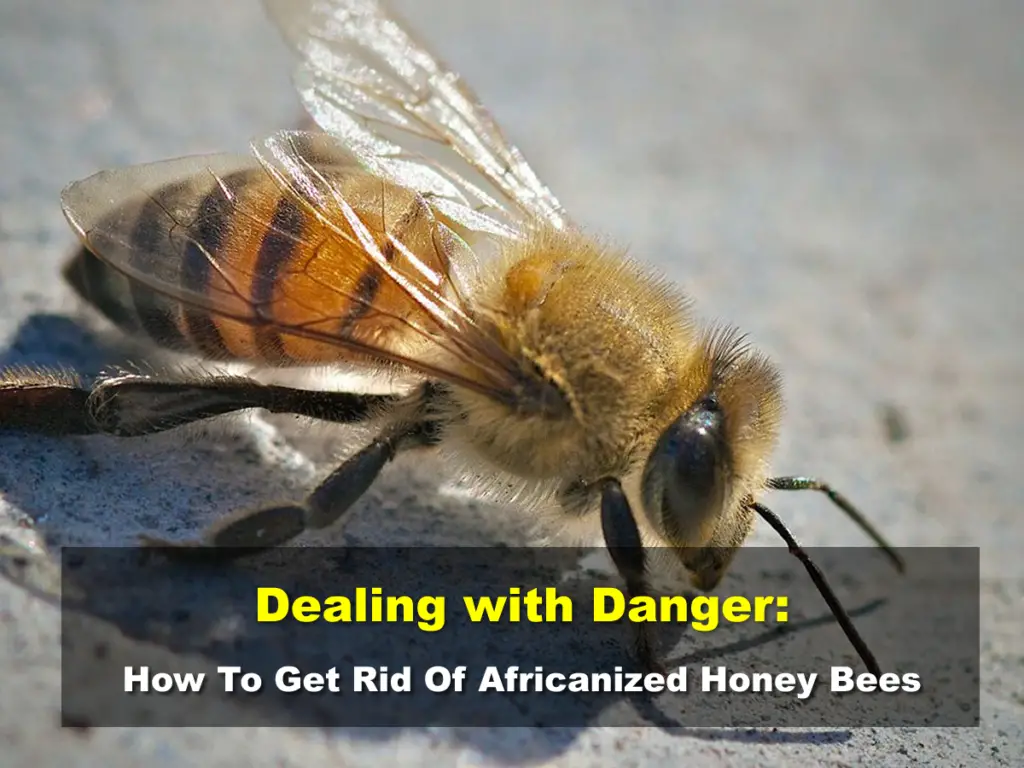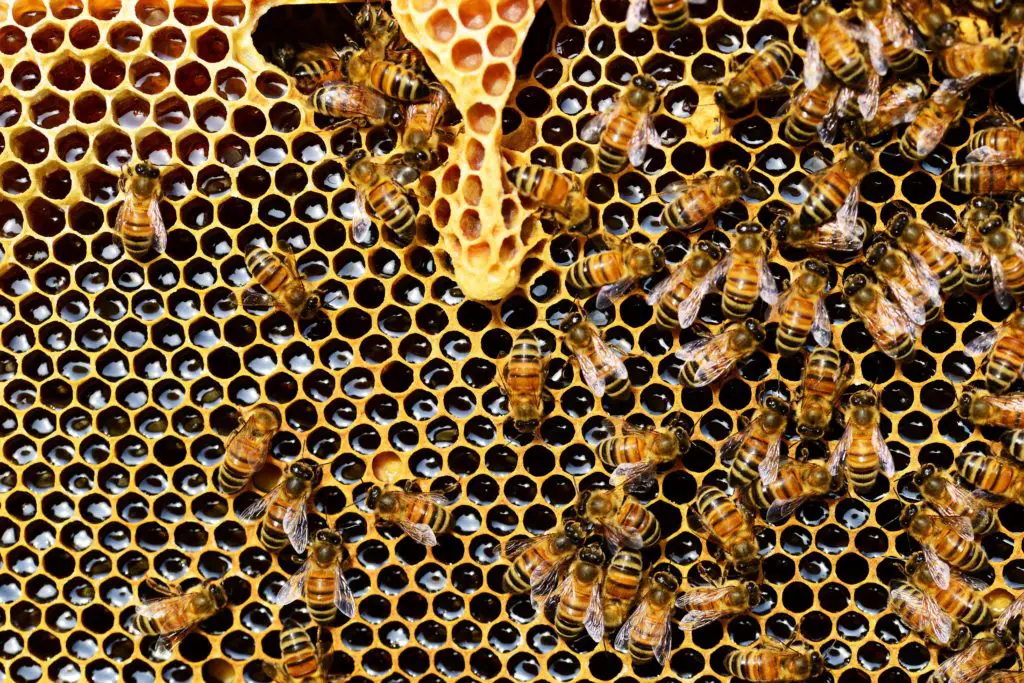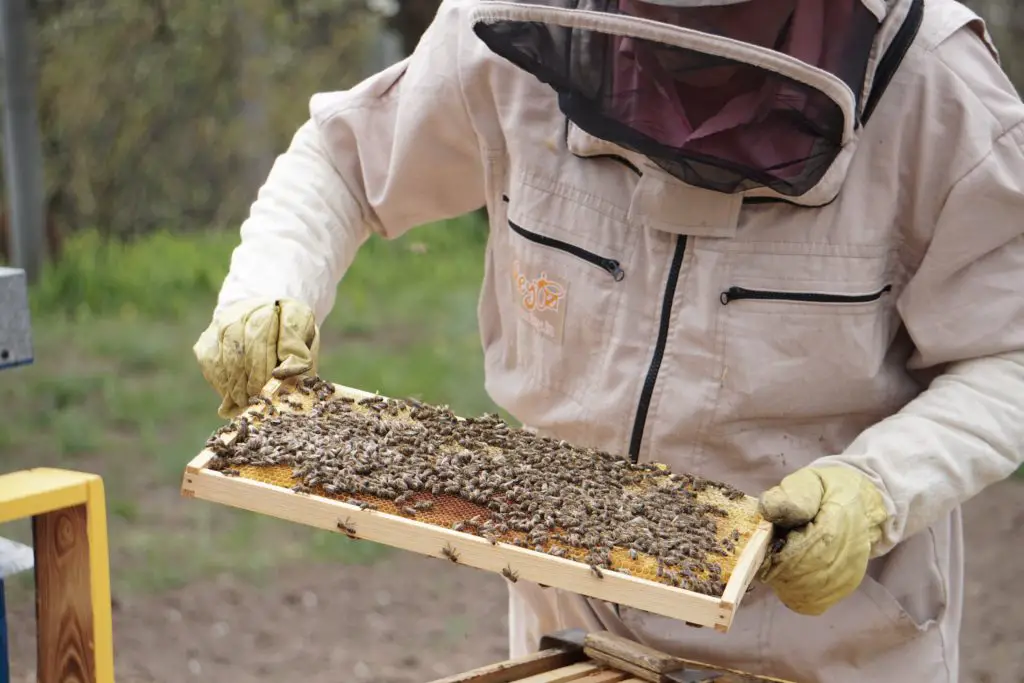Affiliate Disclaimer - As an Amazon Associate I earn from qualifying purchases.
It supports the website. So, Thank you
The European honey bee has been naturalized in North America for hundreds of years and it’s now considered to be an essential part of the ecosystem. However, there is a species of bee that was introduced in the 50s that’s considered to be one of the most invasive types of bees on the planet; the Africanized honey bee.
If you’ve got these dangerous bees around your property and in your garden, you’ve likely wondered how to get rid of Africanized honey bees in the safest way.
The truth is that getting rid of Africanized honey bees is often a job best left to the professionals since this is an aggressive species. However, it is also possible to use pesticides but you must ensure optimal safety when doing so.
Table of Contents
What Are Africanized Honey Bees?
If you look at an Africanized honey bee, you’ll notice that it’s typically smaller than the European honey bees. They also have a more golden-brown coloration with a striped tail and a hairy, bulbous body. However, most people find it quite difficult to differentiate between the two species as they are remarkably similar.
The Africanized honey bee is sometimes called the killer bee because of its aggressive nature and the number of human deaths it causes every year (around 100). Having been introduced to Brazil in the 1950s, the species rapidly spread throughout both South and North America and has since become a serious pest.
However, it wasn’t until around the 1990s that Africanized honey bees really made their mark in the United States. They’re not common in all states as some areas of the US have climates that are too cold for this species. But they are now very common in places like Florida and the Gulf Coast states which gives rise to concern in neighboring states that they’ll soon make their arrival.
Why Are Africanized Honey Bees So Dangerous?
As I mentioned earlier, the Africanized honey bee is responsible for around 100 human deaths each year and around 1000 reports of this have been made in North America. This has earned them a deadly reputation and that’s where the term killer bee was coined.
The problem with this species is that they’re known to be much more aggressive. I have written many articles that discuss the calm and docile nature of the European honey bee which is very unlikely to sting unless it feels a significant threat to the nest.
On the other hand, the Africanized honey bee seems to be constantly geared up and is much more likely to become enraged when it detects even the most minor of potential threats. Even when the bees are resting, they’re on high alert and will react to humans and other animals.
Not only are they dangerous in terms of their aggression and sting, but Africanized honey bees are considered an invasive non-native species. They’re known to kill and eat European honey bees which can knock the ecosystem out of whack. In some of the most extreme reports, Africanized honey bees have even been reported to have killed livestock and pets.
Another issue with the Africanized honey bee is its nesting habits. Since they can be a ground-nesting species (which is unusual for honey bees), they can often cause disruption in the agricultural industry. That’s because when they sense vibrations in the ground, a swarm will emerge from the nest to deal with the supposed threat.
With that said, it is worth keeping in mind that the venom of the Africanized honey bee isn’t any more potent or dangerous than that of their European counterparts. However, since they are an aggressive species, they’re more likely to attack in larger numbers and victims are likely to receive more stings.
This can be problematic to almost anyone but those with a bee sting allergy would do well to keep out of the way of this species because of the potential risks involved.
Even more, we have to keep in mind that this species is known to travel much further when attacking and will chase humans over far greater distances than the European honey bee. In some cases, they will travel for more than a quarter of a mile if it means defending their nest.
Now, with all of this in mind, it would be easy to be absolutely terrified of Africanized honey bees but it’s also worth remembering that there are things you can do to appear less of a threat to them. For example, if you have a couple of these bees around you, the last thing you want to do is swat them. This will only anger them more and could cause more individuals to come and perform an attack.
It’s also really important to protect your property from an infestation of Africanized honey bees and this is something I’ll talk about in more detail later in this guide.
Should I Get Rid Of Africanized Honey Bees Myself?
The Africanized honey bee can pose potential dangers to humans especially if you are not trained to deal with them. That’s why most experts would recommend calling the help of a professional pest controller who will be able to use the safest and most effective methods.
However, that’s not to say that it isn’t possible to get rid of an Africanized honey bee nest by yourself. But I would advise taking extreme precautions.
I’ll discuss both of these options in more detail in the upcoming sections. However, if you know that you have an allergy to bee stings then I would strongly advise you not to deal with the problem yourself.
Ways To Get Rid Of Africanized Honey Bees
Africanized honey bees can be a real pest not to mention the potential risks involved in having them around your property. Later, I’ll be talking about some methods you can use to deter them but for now, let’s take a look at some of the things you can do to remove them from your garden.
Use A Pesticide
Pesticides are one of the most effective ways to deal with any unwanted insects. I’ve spoken time and again about not using these kinds of products on honey bees and other native species. This is because they’re important pollinators that play an essential role in our ecosystems.
However, when it comes to Africanized honey bees, they not only pose a very real threat to humans and animals but they’re also considered to be an invasive species so getting rid of them by killing them isn’t so much of a problem. Of course, your own morals will dictate whether you wish to use this method or opt for some of the more natural approaches I’ve discussed in other articles.
If you decide to tackle the problem yourself using pesticides then the first thing you need to do is make sure you protect yourself. This can be done by wearing appropriate clothing that covers as much of your body as possible. A beekeeping suit is ideal but I understand that most people won’t own one of these. Instead choose solid clothing that covers your arms, legs, and torso. Elasticated cuffs will prevent bees from flying inside your clothing.
It’s also a good idea to wear footwear that covers your entire foot, like thick leather boots and opt for a pair of thick gloves. Eye protection is also a must and keep in mind that these bees are more likely to attack around the head and face so the more protection in this area, the better.
Pesticides designed to kill bees come in several forms including powders, sprays, and foams. They’re all equally effective but it’s important that you direct the product into the nest for maximum effectiveness. What’s more, I would always advise administering the treatment when the bees are least active which means either at dusk or before the sun rises.
Call A Professional
If you are in any way concerned about tackling an Africanized honey bee nest by yourself then it’s probably best to call a professional pest controller. These people have been trained to deal with these insects in the safest way possible. What’s more, you can remove yourself from the situation and avoid any nasty stings which is especially important if you have a bee sting allergy.
The problem that most people have with using a pest control service is the cost. I’ll admit that it can sometimes be pricey to hire a professional but you have to weigh up whether it’s worth the investment for the sake of your health.
As I mentioned earlier, Africanized honey bees cause as many as 100 human deaths each year and that’s not always because of allergies. Since these bees are much more aggressive and sting more often, a single attack can consist of so many stings that it becomes fatal.
Make Yourself Unattractive
While you may not have a nest of Africanized honey bees in your garden, you could find that you get a handful of individuals coming to take a look around. It’s important to remember that these bees, just like any other species, will come to feed off your flowers. If you don’t want them to come to your garden then removing all bee-friendly flowers and replacing them with repelling species can be your first line of defense.
But it’s also important to make yourself unattractive to the bees as they’ll show no interest in you. One of the best things you can do is to avoid wearing dark colored clothing as this species actually sees darker colors as a threat. This is also important when you’re out in nature, such as on a hiking trail.
Another thing that may attract Africanized honey bees is strong scents so it’s a good idea to avoid wearing heavy perfumes or highly scented cosmetic products. Things with a strong floral or citrus scent may be particularly attractive to this species.
When taking care of your garden, you may find that the number of Africanized honey bees rises and this is because they’re attracted to the scent of freshly cut grass. This is why it’s important to take precautions when mowing your lawn such as doing it at a time when the bees are least active.
How To Stop Africanized Honey Bees Coming Back
The last thing you want after successfully getting rid of an Africanized honey bee nest is for the problem to return. This is why it’s really important to get rid of the honeycomb within the nest as this will only serve to attract more bees.
Of course, you’re going to first need to make sure that all of the bees are dead otherwise you’re putting yourself at risk again. When you’re sure there are no more, you can destroy the comb by throwing it away in a sealed bag, burning it, or crushing it and disposing of it.
If the nest is in a hard-to-reach spot such as a high tree branch then you can use your pressure washer to blast it down.
After the nest is dealt with, you’ll need to be vigilant for signs of reinfestation in other areas around your home and garden. This involves performing regular checks and handling any potential new infestations as early as possible. If there are any cracks in your property, these could serve as a nest for the Africanized honey bees so be sure to seal them with a caulk.
Having debris in your yard can be attractive to these bees so it’s important to stay on top of tidying in your garden. Get rid of any log or leaf piles and make sure there aren’t any unused plant pots as bees may see these as a great place to nest.
Final Thoughts
The Africanized honey bee is one of the most feared insect species in North America after its introduction more than half a century ago. This is a far more aggressive species than the naturalized European honey bee and is considered to be invasive.
If you’ve been wondering how to get rid of Africanized honey bees then the best method is to call a professional. These bees can be dangerous and dealing with them yourself may put you at risk. However, it is possible to do it yourself but it’s vital to take the necessary precautions.




